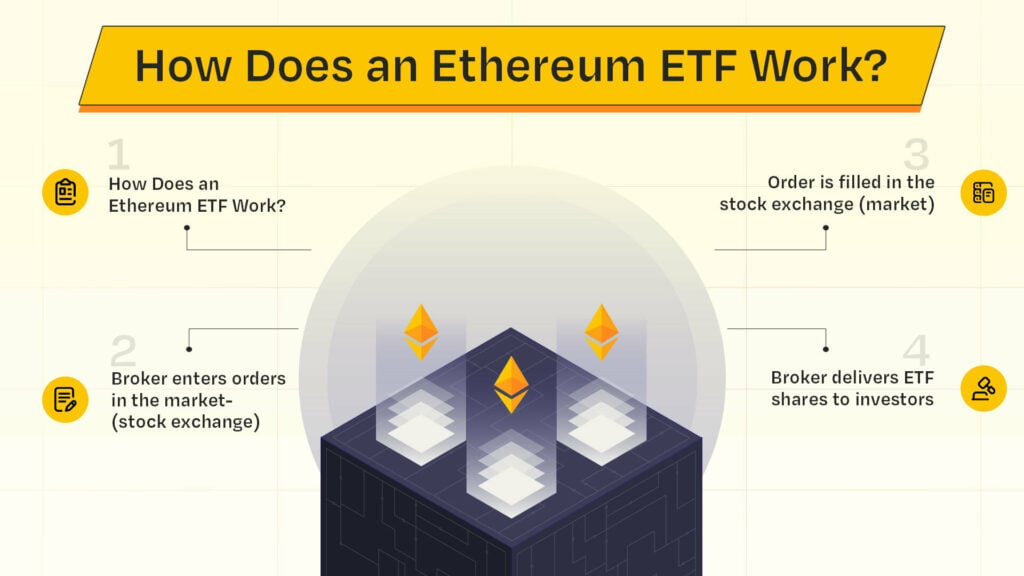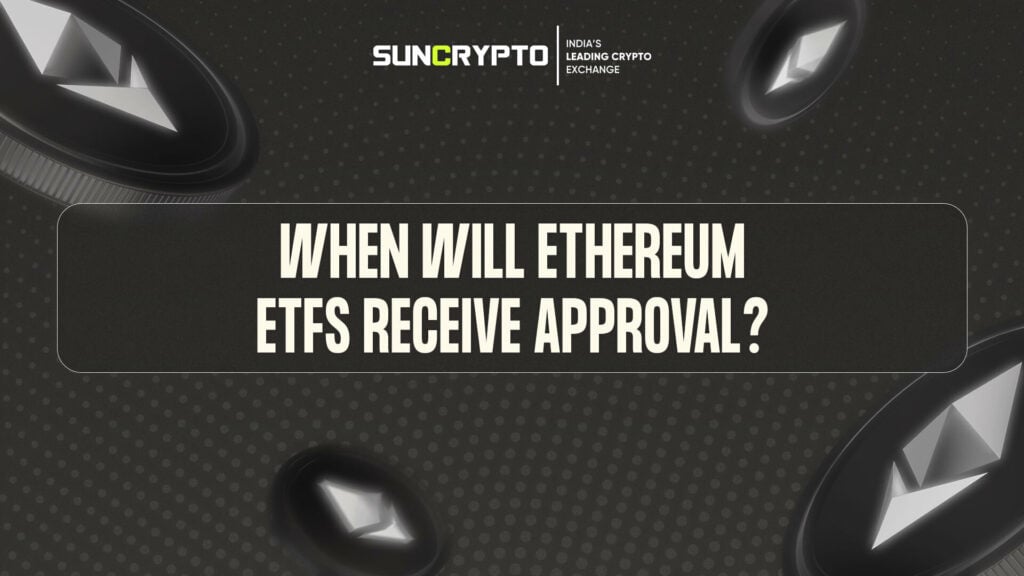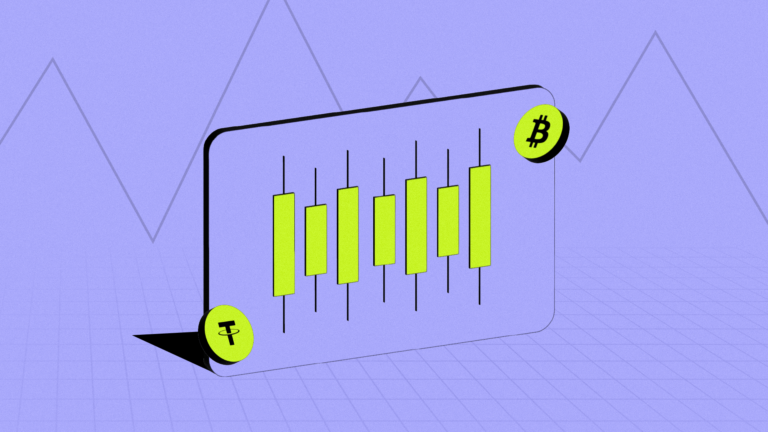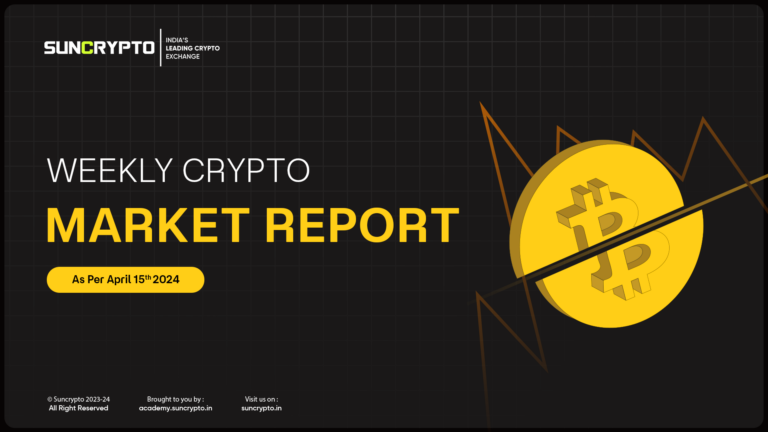In January 2024, the US Securities and Exchange Commission (SEC) approved 11 spot Bitcoin (BTC) ETF applications, prompting the leading cryptocurrency to surpass its previous all-time high and set a new one. This measure is thought to have helped cryptocurrency’s integration into conventional financial systems.
To that end, the Ethereum blockchain has emerged as a strong contender for the next Spot ETF clearance. However, the SEC has again delayed its judgment on whether to approve or reject BlackRock and Fidelity’s spot Ethereum ETF filings. This delay, revealed in separate files on March 4, follows a prior one in January.
Meanwhile, before delving into the approval of a spot Ethereum ETF, let us first define what an Ethereum ETF is, how it works, and how it will affect the price of Ethereum, like Bitcoin, in the near future.
What are Ethereum ETFs?
Ethereum ETFs are financial vehicles that trade on stock markets, similar to individual equities. These funds are designed to track the price swings of Ethereum, the second-largest cryptocurrency in terms of market capitalization. Choosing an Ethereum ETF implies owning shares of the ETF rather than Ethereum itself.

This strategy allows investors to engage in the cryptocurrency market without having to acquire, store, or manage digital assets directly. Moreover, Ethereum ETFs allow investors to include Ethereum exposure in their portfolios while retaining the benefits of an ETF structure, such as liquidity, transparency, and simplicity of access.
These ETFs are often managed by professional investment firms and handle the technical aspects of Ethereum investment. Currently, there are 9 Ethereum ETF applications awaiting the SEC’s decision, with each having a different date. There is anticipation that the SEC will decide on all applications at the same time, as it did with spot Bitcoin ETFs.
Types of Ethereum ETFs
Ethereum ETFs are categorized into two categories: ETH Spot ETFs and ETH Futures ETFs.
▪️ Spot Ethereum ETFs: These ETFs function as gigantic digital wallets, holding Ethereum tokens directly. The ETF’s value corresponds to the real-time price of Ethereum, providing direct price exposure.
For example, if a fund manager establishes an ETH Spot ETF, they will buy real Ethereum tokens. The ETF’s value will fluctuate in response to the real-time price of Ethereum. If Ethereum’s price rises by 10%, the ETF’s value should rise by the same amount, minus any fees or charges.
▪️ Future Ethereum ETF: Ethereum futures ETFs invest in futures contracts based on the price of Ether rather than keeping the cryptocurrency. These contracts commit to buy or sell Ethereum at a predetermined price in the future.
For example, an ETH Futures ETF may invest in Ethereum futures sold on a commodity market. This gives you exposure to Ethereum price swings without holding the underlying asset. The value of the ETF will be determined by how these futures contracts perform.
Working of Ethereum ETFs
Ethereum ETFs function similarly to conventional stocks, allowing investors to purchase and sell them through a brokerage account. This will make Ethereum more accessible to individual investors, particularly those familiar with traditional markets.

As a result, investors who invest in Ethereum ETFs can profit from price swings in the digital asset without really holding it. Unlike direct ownership of Ethereum, ETH ETFs are not responsible for wallet safekeeping when a user stores Ethereum on a decentralized exchange.
The ETH Spot ETF invests directly in Ethereum, acquiring actual Ethereum tokens, so the ETF’s value fluctuates in real-time with Ethereum’s market price. In contrast, the ETH Futures ETF does not directly hold Ethereum, but rather invests in futures contracts linked to it, providing exposure to price swings without owning the underlying asset.
Benefits of Ethereum ETF
An Ethereum ETF would not simply be a trendy buzzword. It would have multiple game-changing benefits:
▪️ Availability: Traditional investors, who were previously hesitant owing to the intricacies of the crypto ecosystem, may now obtain exposure to Ethereum using their existing brokerage accounts. You can purchase and sell them like any other stock using your existing brokerage account, without the need for crypto wallets or sophisticated exchanges.
▪️ Boost in Legitimacy: The mere presence of an Ethereum ETF on major exchanges would provide credibility and validation to the whole crypto industry, bridging the gap between traditional finance and the rapidly expanding world of digital assets.
▪️ Liquidity Lifeline: Increased participation by institutional and retail investors via ETFs might significantly increase Ethereum’s liquidity. This results in smoother, less volatile transactions for everyone, from individual traders to major investors.
▪️ Fewer Security Risks: By eliminating the requirement for personal cryptocurrency wallets, investors reduce their risk of hacking and other digital asset security problems. Furthermore, ETFs are subject to regulatory scrutiny, which provides a level of protection and transparency that is not necessarily available in the crypto market.
Ethereum ETF Vs Bitcoin ETF
While both Bitcoin ETFs and Ethereum ETFs provide exposure to key players in the cryptocurrency industry, their attributes are tailored to different investor profiles and market dynamics. Choosing between them necessitates a thorough analysis of each ETF’s underlying asset and prospective benefits.
▪️ Bitcoin ETFs: Bitcoin, the uncontested king of crypto, stands out as a digital store of value, much like gold. Its ETFs provide an easy method to obtain exposure to its price changes without actually owning the cryptocurrency. Bitcoin has a longer track record and a higher market capitalization, attracting investors looking for stability and established market recognition.
▪️ Ethereum ETFs: Ethereum, termed the “programmable blockchain,” distinguishes itself with its smart contract feature. This opens the door to new uses like as decentralized finance (DeFi) and non-fungible tokens (NFTs), which might drive widespread acceptance and long-term growth. Ethereum ETFs are designed for investors interested in the technology developments and numerous use cases that power the Ethereum ecosystem.
Ultimately, the ideal ETF option depends on your unique investing objectives and risk tolerance.
Ethereum ETFs Approval Timeline: Will it Push ETH to $10,000
According to a filing, the Securities and Exchange Commission (SEC) delayed a decision on a spot Ethereum (ETH) exchange-traded fund (ETF) proposed by Invesco and Galaxy Digital. Currently, CME-listed ether futures are one of the only options for regulated US investors and funds to bet on Ethereum’s growth.
Bloomberg Intelligence analyst James Seyffart said the delayed decision was expected. He stated that “delays are well expected, and that more will occur in the following months. The only date that matters for spot Ethereum ETFs right now is May 23, which is VanEck US’s final deadline.
The potential approval of an Ethereum ETF in May 2024, like the widely anticipated ARK 21Shares or VanEck offers, might unleash a domino effect, such as an increase in Ethereum popularity and an institutional cash flood.
Furthermore, the SEC’s approval of Ethereum ETFs will have an impact not just on the crypto market, but also on the price of Ethereum. Several analysts and leaders expect that it will drive the price of Ethereum to $8,000 to $10,000. However, remember that investing in any digital asset is risky, so conduct your own research before investing in these VDAs.
Conclusion
The imminent launch of an Ethereum exchange-traded fund (ETF) is expected to cause a big upheaval in the cryptocurrency market. While it is now available in Canada, the SEC has yet to approve it in the US. The cryptocurrency market may mature as a result of increased acceptance and institutional involvement through Ethereum ETFs, potentially stabilizing volatility and attracting additional investment.
The potential for Ethereum ETFs is apparent. They represent an important step towards closing the gap between regular finance and the fascinating world of cryptocurrency. While we negotiate the regulatory tides, one thing is certain: the winds of change are upon us, and Ethereum ETFs are prepared to play a critical part in the future of digital asset investment.
To learn more about Ethereum ETFs, go check out SunCrypto Academy.
Disclaimer: Crypto products and NFTs are unregulated and can be highly risky. There may be no regulatory recourse for any loss from such transactions. All content provided is for informational purposes only, and shall not be relied upon as financial/investment advice. Opinions shared, if any, are only shared for information and education purposes. Although the best efforts have been made to ensure all information is accurate and up to date, occasionally unintended errors or misprints may occur. We recommend you do your own research or consult an expert before making any investment decision. You may write to us at [email protected].






Bhut acha